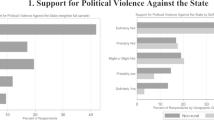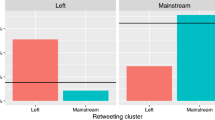Abstract
The Front national (FN), which embraces populism, cultural monism and anti-immigration sentiments, but eschews violence and operates within the borders of legal frameworks, has averaged more than 10 per cent of the popular vote in French local, regional and national elections over the past 30 years. While previous research has extensively captured the historical development and the structural determinants of its success, as well as that of its European sister parties, there is still a relative dearth of scholarship focusing on the activists of radical right-wing groups. I will add to these few existing studies by analyzing the FN’s members. On the basis of interview research with 44 FN activists, I find that individuals who are involved in this populist right-wing party come from diverse social and economic backgrounds and have different types of political socialization. What unites them is their high degree of motivation, their political values (for example, nationalism, anti-immigration), their personal beliefs (for example, the belief in authority and other traditional values) and the fact that they feel at ease within the FN.
Similar content being viewed by others
Notes
The Front National took political power in Marignane, Toulon and Orange (Perrineau, 1997, p. 82).
In a partial election in February, Catherine Mégret also won 52.5 per cent of the vote to become mayor of Vitrolles (Williams, 2006, p. 88).
For instance, she continues to campaign with slogans such as ‘Marine Le Pen: The Voice of the People, The Spirit of France’ (FN, 2013).
I also asked the departmental secretaries about the composition of local FN members to gain some more general information on the members of this populist party.
Simon is another example of family socialization. He states, ‘my engagement has a long family tradition; since the war in Vendée in the 1790s, my ancestors have fought on the side of reactionary forces. Out of family loyalty I continue this fight’ (Interview 35).
According to Stéphan, ‘the institutions of the Fifth Republic suit us. The president can build a strong relationship with the people, he can become like a king of the people, a real leader’ (Interview 37).
Lucie, a middle-aged member of the FN, expresses this anti-immigrant sentiment even more vigorously. ‘We have an overpopulation of immigrants. There are too many foreigners that come and impose their culture and their way of living in France. Colored people, who come from who knows where, aggress us every minute. You cannot walk through the street quietly any more’ (Interview 42).
This feature is quite astonishing given that the FN has a very hierarchical structure, which is modeled after communist parties.
References
Aberbach, J.D., Chesney, J.D. and Rockman, B.A. (1975) Exploring elite political attitudes: Some methodological lessons. Political Methodology 2 (1): 1–27.
Aberbach, J.D. and Rockman, B.A. (2002) In the Web of Politicians in Western Democracies. Cambridge, Washington DC: The Brookings Press.
Adler, P.A. and Adler, P. (1987) Membership Roles in Field Research. Newbury Park, CA: Sage.
Aminzade, R. (1993) Class analysis, politics, and French labor history. In: L. Berlanstein (ed.) Rethinking Labor History. Urbana and Chicago: University of Illinois Press, pp. 90–113.
Art, D. (2011) Inside the Radical Right: The Development of Anti-Immigrant Parties in Western Europe. Cambridge, UK: Cambridge University Press.
Berezin, M. (2007) Revisiting the French National Front: The ontology of a political mood. Journal of Contemporary Ethnography 36 (2): 129–146.
Betz, H.G. (2004) La droite populiste en Europe. Extrême et démocrate? Pôle Sud 21 (21): 132–134.
Betz, H.-G. and Immerfall, S. (1998) The New Politics of the Right: Neo-Populist Parties and Movements in Established Democracies. London: MacMillan Press.
Birenbaum, G. (1992) Le front national en Politique. Paris, France: Balland.
Bizeul, D. (2003) Avec ceux du FN: un sociologue au Front National. Paris: la Découverte.
Blee, K. (2005) Racial violence in the United States. Ethnic and Racial Studies 28 (4): 599–619.
Blee, K. (2007) The microdynamics of hate violence: Interpretive analyses and implications for responses. American Behavioral Scientist 51 (2): 258–270.
Blee, K. and Tayler, V. (2002) Semi-structured interviewing in social movement research. In: B. Klandermans and S. Staggenburg (eds.) Methods of Social Movements Research. Minnesota: University of Minnesota Press.
Bornschier, S. and Lachat, R. (2009) The evolution of the French political space and party system. West European Politics 32 (2): 360–383.
Bos, L., van der Brug, W. and de Vreese, C.H. (2013) An experimental test of the impact of style and rhetoric on the perception right-wing populist and mainstream party leaders. Acta Politica 48 (1): 192–208.
Brannen, J. and Nilsen, A. (2011) Comparative biographies in case-based cross-national research: Methodological considerations. Sociology 45 (4): 603–619.
Carter, E. (2005) The Extreme Right in Western Europe: Success or Failure? Manchester: Manchester University Press.
Checcaglini, C. (2012) Bienvenue au Front: Journal d’une Infiltrée. Saint-Amand-Montrond, France: Jacob-Duvernet.
Coomarasamy, J. (2011) BBC News, Marine Le Pen: ‘Detoxifying’ France’s National Front, Paris, 22 October, http://www.bbc.co.uk/news/magazine-15405326, accessed 17 June 2013.
Crépon, S. (1999) Les Logiques identitaires de l`idéologie des militants du Front national de la jeunesse, une perspective socio-anthropologique sur les nationalisme d`extrême droite des années 90. Doctoral thesis, Université de Paris X-Nanterre.
Crépon, S. (2006) La nouvelle extrême droite – Enquête sur les jeunes militants du Front national. Paris, France: L’Harmattan.
Crépon, S. (2012) Enquête au coeur du nouveau Front national. Paris, France: Nouveau Monde.
Crif. (2006) Les Condamnations de Jean-Marie Le Pen, http://www.crif.org/?page=sheader/detail&aid=29&artyd=5, accessed 13 August 2013.
Davies, P. (1999) National Front and France: Ideology, Discourses, and Power. New York: Routledge.
Davies, P.A.J. (2001) Spies as informants: Triangulation and the interpretation of elite interview data in the study of the intelligence and security services. Politics 21 (1): 73–80.
Declair, E.G. (1999) Politics on the Fringe: The People, Policies, and Organization of the French National Front. Durham, NC: Duke University Press.
de Lange, S.L. (2007) A new winning formula? The programmatic appeal of the radical right. Party Politics 13 (4): 411–435.
Dézé, A. (2012) Le Front national: à la conquête du pouvoir? Paris, France: Armand Colin.
Eatwell, R. (2000) The rebirth of the ‘Extreme Right’ in Western Europe? Parliamentary Affairs 53: 407–425.
Front National. (2013) Le Twitter Officiel du Front National, April, https://twitter.com/FN_officiel, accessed 25 April.
Gingrich, A. and Banks, M. (2006) Neo-Nationalism in Europe and Beyond: Perspectives from Social Anthropology. New York: Berghan Books.
Goodliffe, G. (2012) The Resurgence of the National Front in France: From Boulangisme to the Front National. Cambridge, UK: Cambridge University Press.
Golder, M. (2003) Explaining variations in the success of extreme right-wing parties in Western Europe. Comparative Political Studies 36 (4): 432–466.
Guest, G., Bunce, A. and Johnson, L. (2006) How many interviews are enough? An experiment with data saturation and variability. Field Methods 18 (1): 59–82.
Hewlett, M. (2012) Voting in the shadow of the crisis. The French presidential and parliamentary elections of 2012. Modern and Contemporary France 20 (4): 403–420.
Ignazi, P. (2003) Extreme Right Parties in Western Europe. New York: Oxford University Press.
Ivaldi, G. and Evans, J.A.J. (2005) An extremist autarky: The systematic separation of the French Extreme Right. Southern European Politics and Society 10 (2): 351–366.
Jennings, M.K. and Niemi, R.G. (1981) Generations and Politics: A Panel Study of Young Adults and their Parents. Princeton: Princeton University Press.
Kimmel, M. (2007) Racism as adolescent male rite of passage. Journal of Contemporary Ethnography 36 (2): 202–218.
Kitschelt, H. and McCann, A.J. (1995) The Radical Right in Western Europe: A Comparative Analysis. Ann Arbor, MI: University of Michigan Press.
Klandermans, B. (1986) Psychology and trade union participation: Joining, acting, and quitting. Journal of Occupational Psychology 59 (3): 189–204.
Klandermans, B. (1997) The Social Psychology of Protest. Oxford and Cambridge, MA: Blackwell.
Klandermans, B. (2000) Identity and protest: How group identification helps to overcome collective action dilemmas. In: A. Biel, M. Snyder, T.R. Tyler and M. Van Vugt (eds.) Cooperation in Modern Society: Promoting the Welfare of Communities, States and Organizations. London: Routledge, pp. 162–183.
Klandermans, B. (2004) The demand and supply of participation: Social psychological correlates of participation in social movements. In: D.A. Snow et al. (eds.) The Blackwell Companion of Social Movements. Oxford: Blackwell.
Klandermans, B. and Mayer, N. (2006) Extreme Right Activists in Europe: Through the Magnifying Glass. London: Routledge.
Kling, A. (2012) FN…Tout ça pour ça! La très étonnante évolution du Front National. Strasbourg, France: Éditions Mithra.
Lafront, V. (2001) Les jeunes militants du Front national: trois modèles d`engagement et de cheminement. Revue française de sciences politique 51 (1–2): 175–198.
Lamontagne, B. and Stockemer, D. (2010) The French National Front: A comparison between elected officials’ assessments of popular support for the French National Front and public opinion polls. Perspectives on European Politics and Society 11 (1): 39–59.
Marcus, J. (1995) The National Front in French Politics. Basingstoke: Macmillan.
Mayer, N. (2002) «Les hauts et les bas du vote Le Pen». Revue Française De Science Politique 52 (5–6): 505–520.
McAdam, D. (1988) Freedom Summer. New York: Oxford University Press.
McAdam, D., Tarrow, S. and Tilly, C. (2001) Dynamics of Contention. Cambridge, UK: Cambridge University Press.
McVeigh, R. and Cunningham, D. (2012) Enduring consequences of right-wing extremism: Klan mobilization and homicides in Southern countries. Social Forces 90 (3): 843–862.
Mouriaux, R. (1983) Les syndicats dans la société française. Paris, France: Presse de la FNSP.
Mudde, C. (2007) Populist Radical Right Parties in Europe. Cambridge, UK: Cambridge University Press.
Müller, W. (2009) The snap election in Austria, September 2008. Electoral Studies 28 (3): 514–517.
Oesch, D. (2008) Explaining workers’ support for right-wing populist parties in western Europe: Evidence from Austria, Belgium, France, Norway and Switzerland. International Political Science Review 29 (3): 349–373.
Perrineau, P. (1996) «Le FN en 1995: une question de droite posée à la gauche». In: J. Viard (ed.) Aux Sources du populisme nationaliste: l’urgence de comprendre Toulon, Orange, Marignane, La Tour d’Aigues. Paris, France: Éditions de L’Aube, Monde en cours, pp. 67–95.
Perrineau, P. (1997) Le Symptôme Le Pen: Radiographie des électeurs du Front national. Paris, France: Fayard, L’espace du politique.
Rucht, D. (1999) The transnationalization of social movements: Trends, causes, problems. In: D. della Porta, H. Kriesi and D. Rucht (eds.) Social Movements in a Globalizing World. New York: St Martin’s Press, pp. 206–222.
Rydgren, J. (2004) The Populist Challenge: Political Protest and Ethno-Nationalist Mobilization in France. Oxford: Berghahn Books.
Sniderman, P.M., Hagendoorn, L. and Prior, M. (2004) Predisposing factors and situational triggers: Exclusionary reactions to immigrant minorities. American Political Science Review 98 (1): 35–50.
Stockemer, D. and LaMontagne, B. (2007) Right wing extremism in France: Departmental differences in the vote for the national front. Romanian Journal of Political Science 7 (2): 45–65.
Tarrow, S. (1998) Power in Movement. Cambridge, UK: Cambridge University Press.
Veugelers, J.W.P (1995) The institutionalization of France’s Front National. PhD dissertation, Department of Sociology, Princeton University.
Virchow, F. (2004) Die extreme rechte als globalisierungskritische bewegung. In: I. Bemerburg and A. Niederbacher (eds.) Die Globalisierung und Ihre Kritiker. Frankfurt, Germany: VS Verlag fuer Sozialwissenschaften, pp. 215–232.
Williams, M. H. (2006) The Impact of Radical Right-Wing Parties in West European Democracies. New York: Palgrave Macmillan.
Wodak, R. and Pelinka, A. (2002) The Haider Phenomenon in Austria. New Jersey: Transaction Publishers.
Author information
Authors and Affiliations
Rights and permissions
About this article
Cite this article
Stockemer, D. Who are the members of the French National Front? Evidence from interview research. Fr Polit 12, 36–58 (2014). https://doi.org/10.1057/fp.2014.1
Published:
Issue Date:
DOI: https://doi.org/10.1057/fp.2014.1




